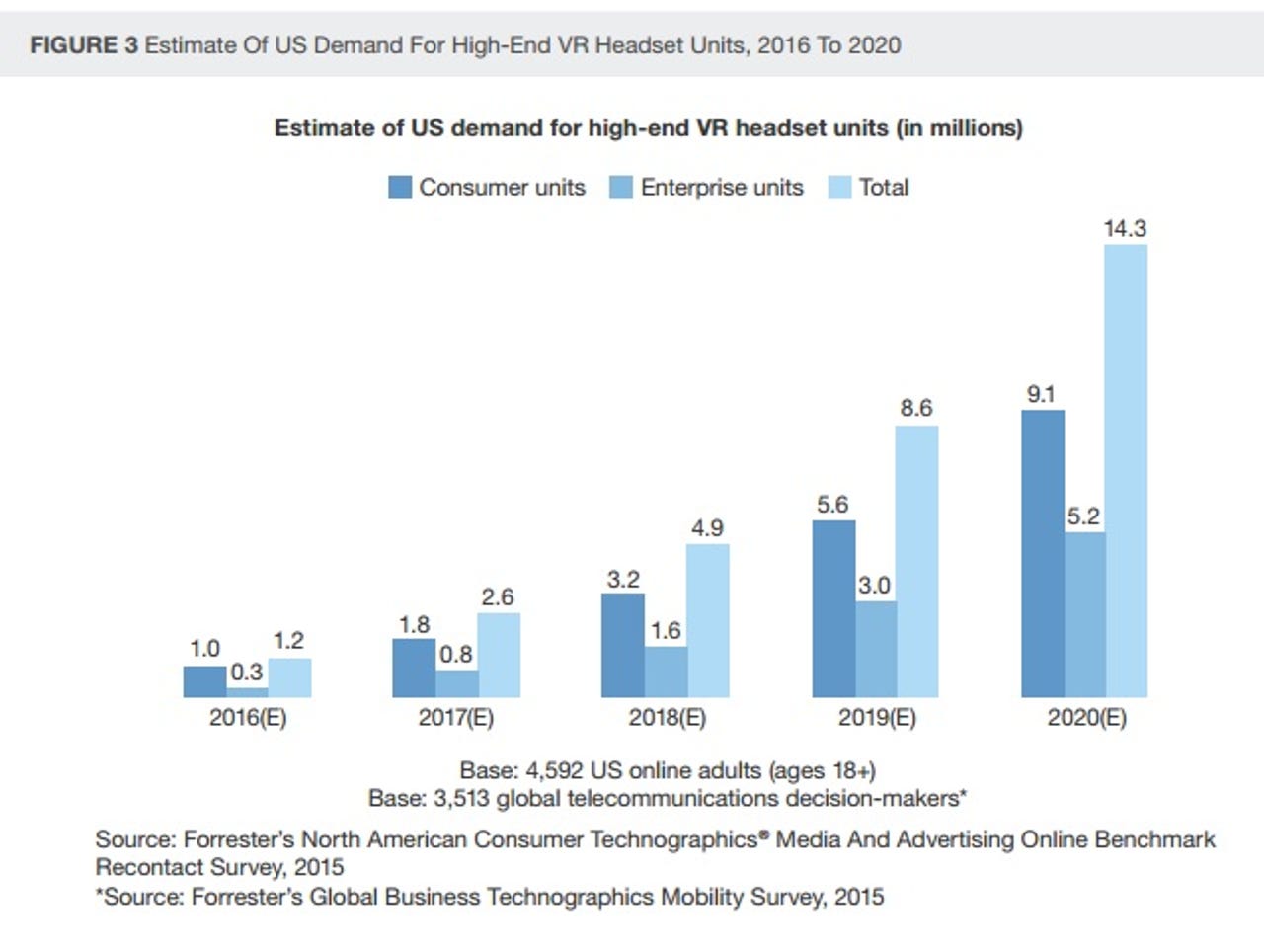Enterprises to target VR market, virtual reality headsets to hit 52 million by 2020

There will be 52 million units of virtual reality head-mounted displays by 2020 as businesses and consumers become users, but marketing execs need to time investments and strategies carefully, according to Forrester Research.
Forrester sized up the virtual reality market and concluded that the market is real and there will be valuable platforms for customer engagement. The catch is that companies and customers will wade into virtual reality (VR) at their own pace.
Also see: VR and AR: The Business Reality | Microsoft to open Windows Holographic to virtual reality vendors
According to Forrester, VR is a real market that business tech buyers need to ponder. However, the research firm did note that there are two sides to the VR debate. One side maintains that VR is more akin to 3DTV, which was a technology that never reached mass adoption. The other side of the argument sees VR as something that'll be as big as mobile. Forrester said in its report the truth will be in the middle.

Overall, Forrester is relatively upbeat on VR. After all, immersive VR systems show promise and smartphone based systems such as Samsung Gear VR and Google Cardboard will boost adoption. Meanwhile, there's an ecosystem emerging. Headsets will be split between high-end and mid-tier adoptions. Forrester didn't try to gauge the market for cheap VR headsets such as Google Cardboard. Microsoft cited 80 million VR headsets by 2020, but that tally could include low-end headsets.
Related: Thanks to virtual reality, could backpack PCs become a trend? | Google VR to build its own headset, announces Unreal and Unity support | At Google I/O, virtual reality push sets up future Facebook duel |
Forrester argued that there can be a VR market now since "the technology is 95 percent there." VR systems have improved along with computing power, developer tools are strong and social media will provide content. Analyst J.P. Gownder said:
The technology is ready, the vendors are in place, and VR's checkered history becomes less relevant every day. But will VR matter to end users? There is nothing that you can do on VR that you can't already do today in some other way. You can virtually visit a remote destination using Skype; play 3D videogames on a game console; and keep up with your social networks, shop for new clothes, or experience breaking news on your phone. However, all of those once-novel experiences do not stimulate your brain as fully as before. This is called habituation, which drives the diminishing pleasure that we derive from a repeated stimulus. So we seek out novel and compelling experiences to get back those intense feelings that we once had. And VR isn't just novel; it's an all-purpose experience intensifier: Anything you do in VR engages your brain more intensely. If VR's done right, it can make any experience novel, compelling, and memorable. This creates the perfect coincidence of wants -- your customer's brain wants to experience VR at the same time that your marketer's brain wants to find a way to engage your customer more intensely.
I can buy that VR argument to a point. Isn't it just as likely that marketers will go too far and screw up the VR experience. Can VR ad blockers be that far behind?
The reality is some early VR efforts will be colossal flops, but there are real business use cases.
Enterprises are expected to drive adoption of VR going forward. Companies will use them for content, healthcare, retail, e-commerce, data visualization and collaboration. Enterprises such as Unilever, McDonalds and sports brands will target VR.
Add it up and the consumer case for VR is sketchy. The business tech use case is more clear cut.
Also:Samsung's Gear VR surpasses 1 million user mark | YouTube gets a VR makeover with 360-degree live video, spatial audio | CNET: Welcome to VR Day at CNET HQ | Unity CEO: Maybe 2016 isn't really the 'year of VR' | TechRepublic: Forrester identifies top 5 VR and AR vendors, Oculus doesn't make the cut | 4 ways AR and VR will change the future of work